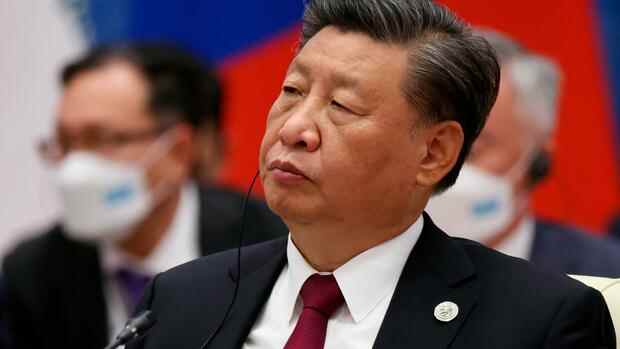China’s head of state and party leader Xi Jinping in mid-September: Fake news about an alleged coup against the powerful Chinese leader spread quickly.
(Photo: dpa)
Berlin It could have been the most important news of the year: China’s all-powerful head of state and party leader Xi Jinping is said to be under house arrest, arrested by his own military apparatus, which he himself heads as supreme commander. Fake evidence of the alleged coup was shared millions of times on social media around the world.
China observers realized within minutes last weekend that there was “nothing to it” about the supposed coup. Very few German news sites reported on the rumors because they were simply not true.
However, the news of the alleged military coup persisted on social networks, including under the hashtag “China Coup”, and continued to spread for days. The incident is a lesson in how quickly unfounded claims multiply on social media – especially when they come from a country as opaque as China.
It all started on Friday. According to an analysis by Mark Owen Jones, a researcher on digital disinformation at Hamad bin Khalifa University in Qatar, most of the tweets surrounding the alleged coup against Xi Jinping at the time came from India and Nigeria.
Top jobs of the day
Find the best jobs now and
be notified by email.
Twitter accounts of African descent also used the attention for the hashtag #Chinacoup to spread completely incoherent tweets with advertising underneath it. Some analysts of the hype also point out that media outlets supported by the religious group Falun Gong played a role in spreading the false news.
Read more issues of our Asia Technonomics column here:
Apparently, days before the big hype, there was a tweet in Chinese that speculated about a military coup because allegedly 60 percent of flights in China were canceled. Further alleged evidence of the coup was quickly invented. One of them read: Xi Jinping was not seen in public again after the end of his trip abroad to Uzbekistan in mid-September – something is wrong!
In the weekly column we take turns writing about innovation and economic trends in Asia.
(Photo: Klawe Rzeczy)
Blogger Jennifer Zeng posted a video on Friday of a military convoy allegedly 80 kilometers long near Beijing in a post on Twitter that was shared thousands of times. The next day, citing “someone who knows the family of a Chinese Communist Party general,” Zeng clarified that the rumors weren’t true.
The story still brought Zeng numerous viewers on her YouTube channel: More than 150,000 people watched her video of the alleged putsch. A great success for Zeng – usually her videos, which she distributes under the title “An Inconvenient Truth”, only see a few thousand people, rarely more than 10,000.
Numerous Twitter users also posted videos of an explosion allegedly recorded in Beijing. In fact, they came from a 2015 detonation at an industrial complex in the nearby Chinese port city of Tianjin.
Party Congress in China: secrecy fuels the rumours
The incident shows how easy it is to spread fake news – even when it’s about a huge event like the fall of China’s powerful leader Xi Jinping. But it also shows something else: namely, how isolated the Chinese government and China as a whole are.
Hardly anyone from the Western world still has access to the top party leadership. There is a lot of secrecy around the party conference on October 16, when Xi Jinping wants to secure a third term in office for the first time in history – rumors fall on fertile ground.
Just before the alleged putsch was circulated, there had been several arrests and convictions of high-ranking government officials. “The rumor that Xi Jinping has been arrested has legs because this is such a sensitive political moment in China,” wrote Drew Thompson, visiting senior research fellow at the Lee Kuan Yew School of Public Policy at the National University of Singapore Twitter. The recent trials and convictions of longtime high-ranking officials have created a cauldron atmosphere, Thompson said.
More: Where Beijing is more modern than Berlin – and where not
